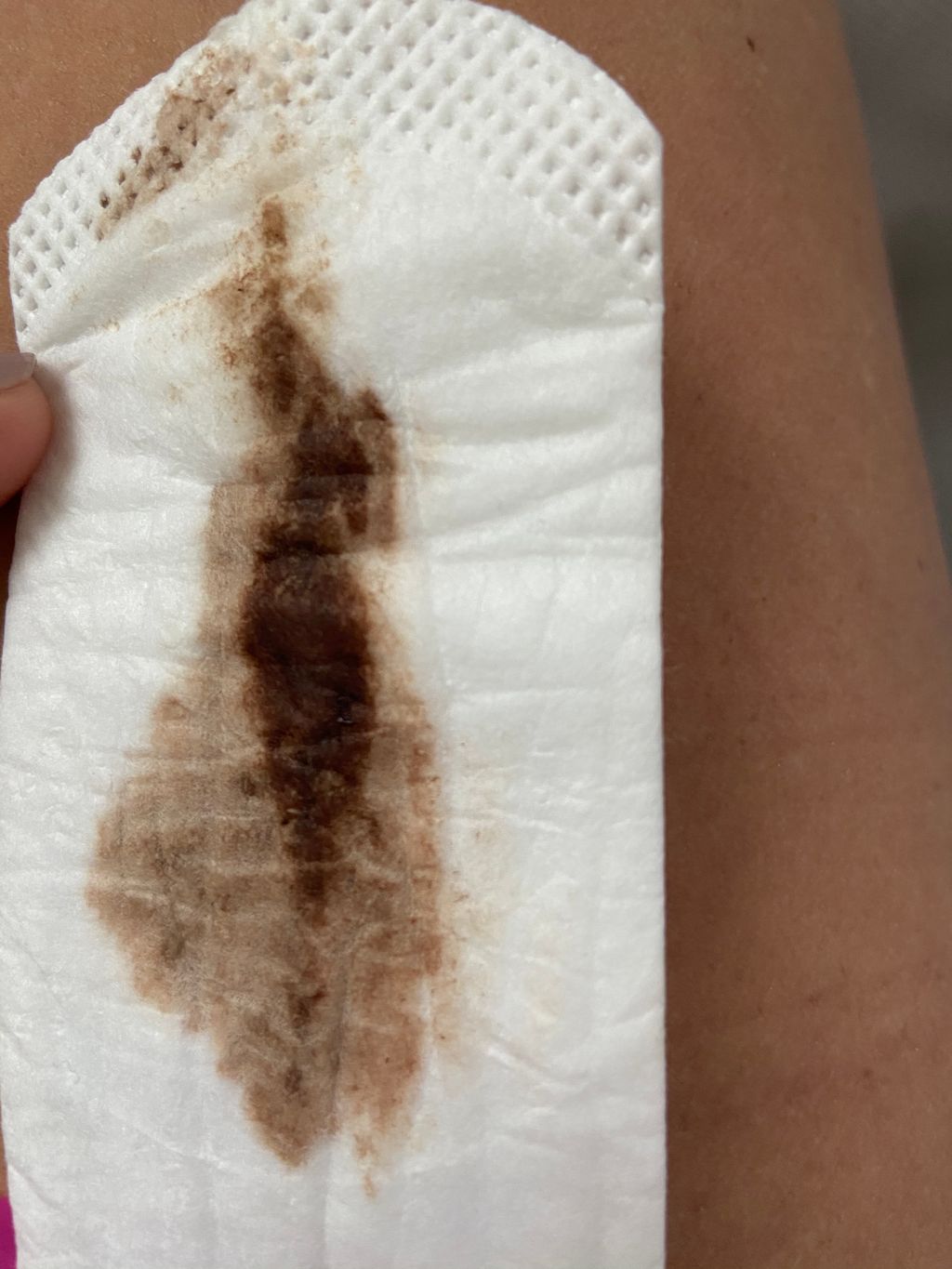Brown discharge before a period often puzzles women, stirring concerns about its implications. This discharge, usually indicating old blood, can arise from natural cycle changes or more serious conditions. While generally harmless, distinguishing between normal occurrences and signs of potential health issues is vital. This post will clarify the causes, address concerns, and explore the safety of brown discharge, offering peace of mind and guidance on when to seek medical advice.

Contents
What Is Brown Discharge?
Brown discharge is a common vaginal discharge that often appears as a light to dark brown color. This coloration results from the blood that has aged and oxidized, taking longer to exit the uterus, hence the brownish hue instead of the fresh red color of recent bleeding. It can occur for various reasons throughout a woman’s reproductive cycle.
Causes of Brown Discharge Before Period
Brown discharge before a period is a relatively common occurrence for many women and can be attributed to a variety of causes. This discharge is typically older blood that has taken longer to exit the uterus, causing it to oxidize and turn brown. Here are several causes of brown discharge before a period:

1. End of the Menstrual Cycle
The most common cause of brown discharge is simply the end of the menstrual cycle. As the period finishes, the flow of blood slows down, and the blood has more time to oxidize, turning from red to brown.
2. Ovulation
Some women experience spotting during ovulation, which can manifest as brown discharge. This occurs roughly halfway through the menstrual cycle when an egg is released from the ovary and can be accompanied by other symptoms like mild cramping.
3. Implantation Bleeding
In early pregnancy, implantation bleeding can occur when the fertilized egg attaches itself to the uterine lining. This can cause a small amount of bleeding that may appear as brown or light pink discharge.
4. Hormonal Birth Control
Starting or changing hormonal birth control methods (pills, IUDs, implants, etc.) can lead to hormonal fluctuations that may cause brown spotting or discharge as the body adjusts.
5. Perimenopause
The transitional phase leading up to menopause, known as perimenopause, can cause irregular menstrual cycles, hormonal fluctuations, and resulting brown discharge due to less frequent ovulation.
6. Cervical or Endometrial Polyps
Polyps are benign (non-cancerous) growths in the cervix or inside the uterine lining that can cause spotting or brown discharge, especially if they are irritated.
7. Sexually Transmitted Infections (STIs)
Certain STIs, like chlamydia or gonorrhea, can cause brown discharge along with other symptoms like pain, odor, or discomfort during intercourse.
8. Pelvic Inflammatory Disease (PID)
PID is an infection of the female reproductive organs, often caused by STIs, and can lead to brown discharge as well as other more serious symptoms.
9. Cervical Erosion
Also known as cervical ectropion, this condition involves changes in the cells lining the cervix, which can lead to increased mucus production and sometimes brown discharge.
10. Thyroid Disorders
Imbalances in thyroid hormones can affect the menstrual cycle and lead to irregular bleeding or spotting.
What Can Brown Discharge Look Like?
When it comes to brown discharge before your period, the color and consistency can vary based on different factors. Here’s a breakdown of what brown discharge may look like:

- Light Brown Discharge: This typically occurs when blood mixes with other vaginal fluids. Even a small amount of blood can give the discharge a brown tint, appearing lighter in color.
- Dark Brown Discharge: Often a sign of old blood, this type of discharge is likely the remnants of your menstrual flow. It’s common to observe dark brown discharge towards the end of your period when you’re no longer actively bleeding.
Brown Discharge Before Period, Could I Be Pregnant?
If you’re experiencing brown discharge before your period is due, you might be wondering, could this be a sign of pregnancy? It’s essential to understand that implantation bleeding can sometimes cause this type of discharge, indicating that you might be pregnant.
During early pregnancy, some women may notice light brown spotting or discharge due to the implantation of the embryo in the uterine lining. This spotting can occur around the time your period is expected, often leading to confusion about whether it’s a normal period or sign of pregnancy.
If you are trying to conceive and have been sexually active without using protection, be mindful of any changes in your menstrual cycle and look out for other early pregnancy symptoms such as nausea, breast tenderness, or fatigue. If you suspect you could be pregnant, consider taking a home pregnancy test or consulting a healthcare provider for confirmation.
In some situations, brown discharge before your period could be a sign of pregnancy, but it’s crucial to rule out other potential causes such as hormonal imbalances, infections, or underlying health conditions. If you have concerns about brown discharge and the possibility of pregnancy, seeking medical advice is recommended to ensure you receive appropriate care and guidance.
Is Brown Discharge Safe?
Brown discharge is generally considered safe and a normal part of a woman’s menstrual cycle in many cases. It often occurs due to the presence of old blood that takes longer to exit the uterus, leading to oxidation and a brown color. This can happen at the beginning or end of your menstrual period, during ovulation, or as a result of hormonal changes associated with birth control use or life stages like perimenopause.
However, while brown discharge is typically harmless, there are situations where it may indicate an underlying health issue. It’s important to consider the context of the discharge, including its timing, frequency, and any accompanying symptoms. Here are a few scenarios where brown discharge could be a cause for concern:
-
If it’s accompanied by symptoms like pelvic pain, itching, foul odor, or discomfort during urination or intercourse, it could suggest an infection or other medical condition that requires attention.
-
Persistent or heavy brown discharge outside of your menstrual cycle could be a sign of hormonal imbalances, cervical or endometrial polyps, or other conditions that may need medical evaluation.
-
After menopause, any vaginal bleeding, including brown discharge, should be evaluated by a healthcare provider as it could indicate more serious health issues, including endometrial cancer.
-
If you suspect you might be pregnant, brown discharge could be implantation bleeding, but if it occurs later in pregnancy, it should be assessed by a healthcare provider to rule out complications.
Frequently Asked Questions
Can brown discharge before menstruation be considered normal?
Brown discharge before menstruation can be normal as it often indicates the presence of old blood. However, it is essential to monitor changes and seek medical advice if the discharge is accompanied by pain, or odor, or occurs frequently.
Is there a possibility of infections causing brown discharge before menstruation?
Yes, infections could be a potential cause of brown discharge before menstruation. If the discharge is accompanied by pain, odor, or other unusual symptoms, it is crucial to consult a healthcare provider for proper diagnosis and treatment.
What serious conditions could be associated with heavy brown discharge before menstruation?
Rare but serious conditions like cancer, ectopic pregnancy, or miscarriage could present with heavy brown discharge before menstruation. It is important to seek immediate medical attention if experiencing such symptoms.
I am a medical student with experience and interest in Women’s health and well-being.